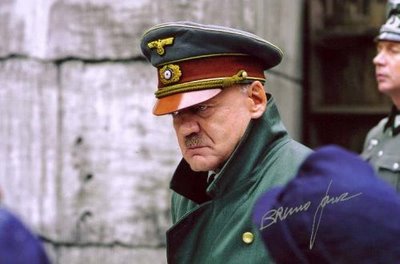 However Downfall has eclipsed another fine German movie, Sophie Scholl, which depicts the true story of a 21-year-old German girl who was executed for treason in 1943. I'm not quite sure why the film focused almost entirely on Sophie, as her brother and a friend were also captured and subjected to a kangaroo court before being condemned to death with her, but the result is a success. Julia Jentsch (who was also in The Edukators) delivers a mesmerising performance as Sophie Scholl and quite rightly won the Best Actress award at the European Film Academy Awards of 2005.
However Downfall has eclipsed another fine German movie, Sophie Scholl, which depicts the true story of a 21-year-old German girl who was executed for treason in 1943. I'm not quite sure why the film focused almost entirely on Sophie, as her brother and a friend were also captured and subjected to a kangaroo court before being condemned to death with her, but the result is a success. Julia Jentsch (who was also in The Edukators) delivers a mesmerising performance as Sophie Scholl and quite rightly won the Best Actress award at the European Film Academy Awards of 2005. Sophie Scholl also beat two excellent films, Hidden and My Summer of Love to win the Best Film award which is slightly surprising, as this is in many ways the least challenging of the three films.
Sophie Scholl also beat two excellent films, Hidden and My Summer of Love to win the Best Film award which is slightly surprising, as this is in many ways the least challenging of the three films.Perhaps what is so remarkable about this film is the insight that it gives into an aspect of Nazi Germany that so few of us are aware of. We talk of the Germans and the Nazis as if they were one and the same thing and see no dichotomy between belligerent, bellicose country that conquered most of Europe in the 40s and the peaceful democracy that gave us the soporific tones of James Last and Richard Clayderman.
During the war it was necessary to portray the enemy as universally evil, but sadly this propaganda has become embedded in the national psyche and remains with us today. How many people are aware of the fact that the Communist Party was as big as the National Socialist movement before Hitler took power and erradicated all opposition? Of course it could be argued that it is typical that a German film should focus on an isolated act of heroism rather than the more general atrocities committed by hundreds of thousands of Germans, but I think the film served a very useful purpose. The many millions of Germans who weren't Nazi didn't all disappear or convert overnight. They felt impotent in the face of a totalitarian state and remained silent.
Sophie Scholl is a tribute to the bravery of the few, but also a reminder of how dificult it was for ordinary Germans to fight Naziism. Sophie and Hans Scholl tried and paid the price.

2 comments:
Hi Steerforth
Might come back to give you my take on nazi history later; but really just wanted to take an opprtunity to tell you Clayderman is french.
Last, Kaemfert, and Wunderlich are the true greats of 70's german big band!
Andrew Mishmash
Clayderman French? I'm still recovering from the discovery that James Last isn't an Englishman.
Post a Comment